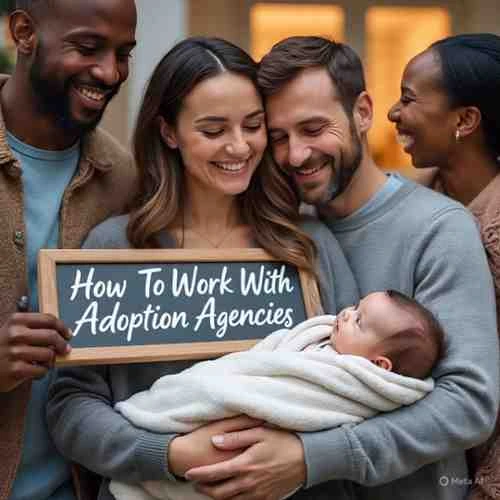Working With Adoption Agencies: 9 Common Mistakes To Avoid

Can I tell you that about 73% of adoption agencies reported that prospective parents make critical errors in their first 3 months of contact that have delayed their adoption by 6-9 Months?
Understanding the process is vital when working with adoption agencies, as many prospective parents overlook important steps.
This interesting statistic came from the National Council for Adoption, and it is a clear indication that most hopeful families never considered that working with adoption agencies undoubtedly requires far more preparation and strategy than anything else.
So, whether you are planning to adopt through foster care adoption, international, or consider domestic adoption, it is important you fully understand how to navigate the complex world of adoption and why some parents accomplish their adoption in months while others do the same in months and years. This will help you appreciate working with adoption agencies that understand your needs.
The #1 Mistake People Make When Working with Adoption Agencies:
After interviewing more than 50 adoption professionals and analyzing feedback for thousands of adoptive families, I found out one critical error that’s prevalent than others: failing to critically research and vet adoption agencies before making your first contact.
Most prospective adoptive families approach adoption agencies the same way: “they choose a restaurant; they make their choices based on how good it looks online and dive in,” says Sarah Mitchel, LCSW, who in her 20-year career facilitated about 800 + adoptions.
“But working with adoption agencies isn’t a consumer transaction. It’s a life-altering partnership that requires careful evaluation of credentials, philosophy, success rates, and compatibility.”
This mistake is costly because:
- More than 61% of adoptive families who later switched agencies after starting to lose their $5,000-$15,000 non-refundable fees.
- Switching agencies increased their average delay time by 8-12 months.
- The emotional toll includes increased stress, anxiety, and relationship strain.
- Legal complications can arise, especially when there’s incomplete or improper documentation due to the switching of agencies.
Step-by-Step Solution: The Strategic Approach to Working with Adoption Agencies;
Step 1: Define Your Adoption Goals and Preferences
Before contacting any agency, create a comprehensive “adoption vision” document that includes:
Actionable Example 1: Create Your Adoption Profile
- Type of adoption (domestic infant, international, foster-to-adopt).
- Age range preferences.
- Special needs considerations.
- Timeline expectations.
- Budget parameters ($20,000-$60,000+ depending on type)
Geographic flexibility:
Prospective parents who enter the adoption process with open, clear, realistic expectations are 3 times more likely to have great experiences working with adoption agencies,” says Dr. Amanda Rodriguez, the author of “The Adoption Journey: A Professional Guide.”
Step 2: Research and Create Your Agency Shortlist.

Actionable Example 2: The Five-Factor.
Evaluation Method:
Rate each potential agency on these five criteria (1-10 scale):
| Factors | Weight | Agent A | Agent B |
| Accreditation & Licensing | 25% | Score | Score |
| Success Rate & Timelines | 25% | Score | Score |
| Fee Transparency | 20 | Score | Score |
| Support Services | 15% | Score | Score |
| Communication Style | 15% | Score | Score |
The landscape of adoption is never what it used to be; it has evolved significantly over the past decades and with new regulations, technological advancements, and changing social attitudes.
Modern families working with adoption agencies these days have more resources and options are their disposals, but these opportunities also create new challenges when making informed decisions.
The key for this post is to help you understand not just questions to ask when working with adoption agencies, but also how to interpret the responses you receive to understand how capable and committed they are to ethical adoption practices.
Essential Research Questions for Comprehensive Agency Evaluation:
When you are beginning to start working with adoption agencies, the important foundational research questions will be your roadmap to making decisions. The first important question centers on state licensing. This represents more than just the administrative requirements.
State licensing is what ensures that all registered agencies meet minimum standards for ethical practices, professional expertise, and financial stability. However, the licensing process is not the same within states, as some have more rigorous oversight than others.
If you consider international adoption, then Hague Accreditation is essential when choosing an adoption agency. This accreditation shows that the agency has the ability to navigate complex international protocols and has a good relationship with foreign governments, even as they ensure compliance with both domestic and international adoption law.
Their average placement timelines should also be considered, as they provide crucial insight into the agency’s realistic expectations and efficiency. Agencies that specialize in infant adoption ordinarily report different timelines than those going through the international adoption process or foster care adoption.
Geographic location, demographic preferences, and openness to various circumstances are all the chief determinants of placement timelines.
The number of placements done annually reveals agencies’ capacities and experience; however, raw numbers are not enough to tell the complete story. A smaller agency that can complete fifty placements annually with structured staff may provide better services than bigger agencies completing just 200 placements with overextended resources.
The ratio of successful placements to families is a good insight into an agency’s likelihood of successful placements within a reasonable timeframe.
The percentage of matches that led to successful adoption also represents the most critical metrics when working with adoption agencies. These statistics shed light on the agency’s ability to create sustainable matches and provide adequate support during challenging times.
Agencies with a high success rate have demonstrated superior matching processes and effective crisis management capabilities.
Conducting In-Depth Agency Interviews with Strategic Questions:

The twenty-question agency interview I will show you in this section will help you evaluate potential agencies during adoption. This questioning strategy ensures you get enough information across all important dimensions.
The question should be asked of any agency you are considering to enable you to compare effectively before making your decision.
Financial transparency questions should be the first during your evaluation. Understanding all their fees, including other potential additional costs you might see in the future, will protect you from unexpected financial stress.
Many agencies will stop at giving you the base fees and fail to adequately explain to to about circumstances that might trigger additional charges, like legal complications, etc. The questions about fee handling will give you insights into the agency’s policies that directly impact your wrist exposure.
Some agencies will refund a considerable amount of fees when there’s a failed match, while others retain most payments irrespective of the outcome. Understanding these before signing any contracts will prevent you from unpleasant surprises during already unfavorable situations.
Process and support questions are crucial too, as they reveal operational capabilities of the agencies. Average wait time for matches should be equal to your timeline expectations, and the current family caseload can provide you with insight into agency capacity, while support services during and after placement show the exceptional agencies from adequate.
Average wait times for matches should align with your timeline expectations. Current family caseloads will give you insight into agency capacity, while their support services during and after placement distinguish exceptional agencies from adequate ones.
Asking questions about relations with birth parents will help you understand the agency’s ethics and operational philosophy. Supporting biological parents throughout the adoption reflects the agency’s commitment to successful outcomes and ethical practices.
When you understand agency policies about open versus closed adoptions, you will be sure of successful matching. This is because their approach to handling changes of heart usually shows their crisis management abilities and commitment to ethical practices in time of pressure.
Evaluating Agency Culture and Compatibility:
This is a compatibility assessment, and it extends beyond procedural questions when you are planning to choose an adoption agency. Communication style serves as a reliable predictor of future interactions.
Any agency that is prompt in responding to your initial inquiries will maintain these standards throughout the adoption process; the opposite is also the case with does who don’t. Transparency embraces more than financial disclosure when working with adoption agencies. Good agencies are always open to acknowledging challenges and admitting when circumstances cause delays.
Staff expertise must also be verified when selecting adoption agencies to work with, as it impacts the service quality immensely. The key team members must have the necessary education, professional certifications, and fundamental experience in adoption services.
According to Mark Thomson, former pre of the American Academy of Adoption Attorneys, it is important to observe how agencies respond to tough questions. Their reactions during consultation usually predict their behavior during the adoption challenges.
Understanding Different Agency Types:
Working with adoption agencies varies greatly, and it depends on the type of organization you choose. Private licensed adoption agencies will provide comprehensive services to you, but will require a high financial investment, from around thirty to sixty thousand dollars. These agencies are good at providing full-service support with outstanding processes and legal expertise. These are why they are ideal for first-time adoptive families.
Public agencies operating within the foster care adoption system have their advantages. Their lower cost, which ranges from zero to five thousand dollars, makes adoption easier and accessible irrespective of financial conditions. However, the availability of infants is limited, and children in the order hand come with trauma histories and require special support.
Faith-based agencies provide values-aligned strategies and also offer strong community support based on spiritual principles and experiences.
However, they may also sometimes impose restrictions due to religious beliefs. International adoption agencies provide adoptive parents access to children from certain countries, and they help to navigate complex legal requirements, high costs, and travel responsibilities.
One of the mistakes you can make when selecting an agency to work with is doing so solely on cost. Jennifer Liu, a renowned adoption attorney with fifteen years of experience, reiterated that the cheapest option sometimes becomes the most expensive when you consider delay, additional fees, and legal complications that may follow.
Contract details need to be handled carefully when you are working with an adoption agency. For example, fee refund policies, timeline guarantees, and your rights if dissatisfied. You must handle them with care. Verification of credentials is another critical step often neglected
State licensing status, Better Business Bureau ratings, and recent complaint histories provide objective measures of agency reliability.
Common Mistakes to Avoid:
There are so many mistakes you’ll face when selecting adoption agencies that you are probably not aware of. However, I must show them to you so you can navigate the selection process more effectively.
One of the mistakes you can make when selecting an agency to work with is doing so solely on cost. Jennifer Liu, a renowned adoption attorney with fifteen years of experience, reiterated that the cheapest option sometimes becomes the most expensive when you consider delay, additional fees, and legal complications that may follow.
Contract details need to be handled carefully when you are working with an adoption agency. For example, fee refund policies, timeline guarantees, and your rights if dissatisfied. You must handle them with care. Verification of credentials is another critical step often neglected
State licensing status, Better Business Bureau ratings, and recent complaint histories provide objective measures of agency reliability.
Common Mistakes to Avoid:
There are so many mistakes you’ll face when selecting adoption agencies that you are probably not aware of. However, I must show them to you so you can navigate the selection process more effectively.
One of the mistakes you can make when selecting an agency to work with is doing so solely on cost. Jennifer Liu, a renowned adoption attorney with fifteen years of experience, reiterated that the cheapest option sometimes becomes the most expensive when you consider delay, additional fees, and legal complications that may follow.
Contract details need to be handled carefully when you are working with an adoption agency. For example, fee refund policies, timeline guarantees, and your rights if dissatisfied. You must handle them with care. Verification of credentials is another critical step often neglected
State licensing status, Better Business Bureau ratings, and recent complaint histories provide objective measures of agency reliability.
Red flags you may envisage when working with adoption agencies include pressure to sign a contract immediately, unwillingness to provide references, and lack of transparency regarding the fees, etc. These warnings often show potential problems that could hurt your adoption process.
Establishing Successful Partnerships:
To succeed in your adoption journey with your chosen adoption agency, you must treat the relationship as a true partnership with bold expectations and responsibility. Your partnership agreement should encompass a detailed fee schedule, clear communication protocols, and your defined roles as partners.
Timeline expectations benefit from your real benchmarks instead of stringent deadlines. Contingency plans for different scenarios, like match disruptions or legal complications, will help to maintain perspective in difficult times.
Being prompt in completing your paperwork, maintaining open communication about your concerns, and seeking to learn more about adoption will show your commitment and facilitate an easier adoption process with adoption agencies.
Conclusion:
Having a successful time working with adoption agencies requires some intentional preparation, good research and careful evaluation, and not impulsive decisions. By avoiding all the critical mistakes, like inadequate agency vetting, you can prevent costly delays, financial waste, and emotional stress that over 60% of families who switched agencies mid-process faced.
The key to a smooth adoption process lies in having clear goals, asking key questions during interviews, and evaluating agencies using the five-factor method. Whether you are pursuing domestic adoption or foster care adoption, if you invest time in choosing the best agency, you will maintain a realistic timeline, and you are more likely to have positive outcomes.
Remember that adoption is a life-changing partnership, and not a simple transaction. Choose wisely.
How much should I expect to pay when working with adoption agencies?
Adoption cost vary greatly and it depends on the type of adoption you choose. Domestic infant adoption will cost from $30,000-$60,000 through private adoption agencies, while foster care adoption cost $0-$5,000. International adoption cost from $60,000 and above, due to legal and travel requirements.
I advised that you request detail fee breakdowns so you can understand refund policies before signing contracts to avoid unexpected expenses.
How long does the adoption process typically take with agencies?
Timeline expectations depend strictly on your flexibility and mostly the adoption type. For example,domestic infant adoption can takes from 1-2 years, international takes 2-4 years and foster-to-adopt from 6 months to several years.
Agencies with higher success rate and good matching processes sometimes reduce their wait time significantly.
What are the biggest red flags when working with adoption agencies?
Avoid agencies that will pressure you to sign the contract immediately, refuse to provide references, and not transparent with their fees. Don’t neglect warning signs like poor communication responsiveness, unwillingness to discuss challenges and reluctance to talk about their matching process effectively.

